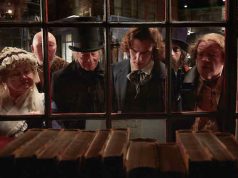“The Hours” is a parade of sad, beautiful performances, a sort of gorgeous funeral procession of acting. Its structure allows each actor the opportunity to emote with Oscar-worthy fervor at least once, and in the case of some of them, several times. A young thespian could open the screenplay to nearly any page and find a scene or monologue worth memorizing for auditions. It’s that good.
The screenplay, by David Hare, is based on Michael Cunningham’s Pulitzer Prize-winning novel, whose multi-storied structure and action-less plot make for an introspective book and a seemingly unfilmable movie. Yet here it is, directed by Stephen Daldry (“Billy Elliot”) with such grace and cinematic flair that it’s hard to imagine it NOT being a movie.
It is about three women who are on the edge: Before the film’s end, they will either learn to cope with life, or else they will give up on it completely. The title refers to what one does in the hours AFTER the party. Once the momentary diversions have ended, are we still able to deal with life? That is the question here.
The first woman is Virginia Woolf (Nicole Kidman), the troubled British novelist who, in 1923, when we see her, is writing her most famous book, “Mrs. Dalloway.” Her husband (Stephen Dillane) worries for his wife’s well-being; she clearly is not happy, but neither he nor the doctors can figure out why.
Next is Laura Brown (Julianne Moore), a nervous housewife in suburban Los Angeles in 1951. She has a young son and a devoted husband (John C. Reilly), but all is not well. She is uncertain about something. She has begun reading “Mrs. Dalloway”; it will inspire her one way or the other.
Finally, in 2001, is Clarissa Vaughn (Meryl Streep), a modern-day Manhattan version of Mrs. Dalloway, a frequent thrower of parties, and a friend to many of the artists and writers in Gotham. On the day in question — for the film examines one pivotal day in the life of each heroine — Clarissa is planning an event in honor of her friend Richard (Ed Harris), an AIDS-stricken poet who is being given a major award.
Thanks in part to a prosthetic nose and frumpy costuming that render her unrecognizable, Nicole Kidman is terrifically, tragically sad as the dowdy Virginia Woolf. She carries the melancholy in her eyes, and though the fake schnoz doesn’t look quite as good when examined closely, that doesn’t stop Daldry from shooting her in tight close-ups, to let us see those sad eyes. Kidman’s performance is breathtaking; she has lost herself completely in the utterly unglamorous role.
Julianne Moore, who excelled once this year already as a heavyhearted 1950s housewife in “Far From Heaven,” goes back to the well for more angst as Laura Brown. What an achingly sympathetic and wrenching performance this is! She is even better than Meryl Streep, and Meryl Streep is fantastic as Clarissa, who is slowly melting under the pressure of daily life.
Ah, and then there are glorious supporting turns by John C. Reilly and Toni Collette, help from Claire Danes and Allison Janney, a remarkable couple of scenes with Ed Harris, and even a fine speech by Jeff Daniels.
And it is all organically directed by Daldry so that it appears to be one cohesive story, and not a series of attention-grabbing star turns. Since the stories, being set in different time periods, do not actually intersect very much, Daldry finds other ways of uniting them, using little visual devices to keep the divergent narratives from breaking apart. There are obvious points like each of the heroines being in bed when the film begins; and then there are subtle maneuvers like having Julianne Moore scrape a failed cake into the trash early on, and then having Meryl Streep dispose of a tray of hors d’oeuvres in much the same fashion near the end. They are small efforts that pay off richly. When “The Hours” is over, you are blissfully unaware of the cunning necessary to pull off such a fine film; all you know is that you have seen a masterful piece of work whose emotional resonance is so natural, you wonder why more films can’t accomplish it.
A (1 hr., 55 min.; )




